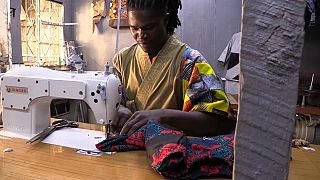Ghana
Children playing with toy trucks or women singing. The artworks on Michael's canvas were once dresses, shirts or skirts. The young man has expertly cut the colourful fabrics.
With fashion off-cuts from tailoring shops or second-hand markets, the young contemporary artist based in Accra, has made his newest textile art piece.
"This fabric [Editor's note: pointing at a large piece of five men wearing matching trousers]; I sourced them from Kantamanto and then this one is from a friend that sews, and this piece is from Woodin."
Using textile waste is not just about finding cheap materials - Gah also has environmental reasons:
"Fashion sense is growing faster nowadays, so they tend to leave the old fashion down, so I go for them to create my artworks. I don't want them to end up in the seas, in the gutters, to choke them."
Gha's ecological mindset has inspired others. Franklin Maduka Izechukwu, one of his suppliers, was intrigued when Gha first approached him.
"When they come for [textile waste], we don't know what they use it to do, it could be that it causes a lot of environmental damage, right?", the CEO of Fenz Fashion Limited, a fashion design shop in Accra confesses.
When "[Gah] comes for it, he uses them to make arts, to make pieces, which is actually good and contributing a lot to our environment, which is very key, and I think it has also opened up my mind to a new line of business to be more environmentally conscious, because we have to be eco-friendly."
Textile waste problem
One of West Africa's hub for second-hand clothing is Accra. Kantamanto market receives items of clothing from Western countries. However, Ghana struggles to deal with textile waste.
According to environmental experts the country has a problem.
"Every week, two million (items of) second-hand clothing are imported," Yaw Akwaa Lartey, an environmental health researcher details. "Investigations revealed that 40 percent of these items turn into waste and are dumped at the landfill sites and other crude or unauthorized refuse dumps across the country."
Michael Gah collects several large bags of textiles each week.
His works have been exhibited and sold in both local and foreign markets; as works to turn the tide on Ghana's textile waste.












02:20
Descendants of enslaved Africans find connection in Ghana
Go to video
U.S. slashes visa duration for some African nationals amid policy shift
01:05
Pharrell Williams presents Spring/Summer 2026 collection for Louis Vuitton
Go to video
Evacuations begin: African citizens caught in Israel-Iran crossfire
Go to video
Ghana's former finance minister place on Interpol Red Notice list over corruption allegations
Go to video
Sustainability in vogue at Casablanca's Style and Tex show